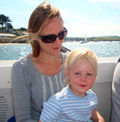 Taking my son George for his routine vaccinations at two, four and 12 months I never really gave them a second thought. To be honest, sitting in the waiting room beforehand I couldn’t tell you exactly what he was being vaccinated against, it was just another doctors appointment, albeit an important one, to squeeze in between feeds and nappy changes.
Taking my son George for his routine vaccinations at two, four and 12 months I never really gave them a second thought. To be honest, sitting in the waiting room beforehand I couldn’t tell you exactly what he was being vaccinated against, it was just another doctors appointment, albeit an important one, to squeeze in between feeds and nappy changes.
Like many parents, it never crossed my mind that George would actually pick up a deadly disease. The odds are slim, especially as he was fully vaccinated. But that was before George contracted meningitis B and septicaemia, which I now know he wasn’t protected against because there is no vaccine currently available for it.
With a speed and severity that only those who have witnessed it can begin to understand, in the space of 24 hours he went from being a healthy, fun and boisterous 23-month old to an incredibly sick little boy fighting for his life.
Seeing the tell-tale spots of ‘the rash’ appear on his body that evening in July 2011 was the worse moment of my life. I knew straightaway it was meningitis and septicaemia and yet despite recognising some of the symptoms – a high temperature, floppiness and of course the rash – I had no idea how aggressively the disease attacks the body or how quickly it can be fatal. Or how notoriously difficult it is to treat.
In the first 12 hours of being transferred to intensive care George suffered three cardiac arrests. It was so sudden and so shocking we could barely take it in. Remarkably, and thanks to the tremendous care he received, our little fighter made a full recovery but it was a nerve wracking road to recovery for us all.
When we brought him home from hospital he was a shell of his former self. A lively, cheeky little lad he temporarily lost his eyesight, and spent weeks learning to walk, talk and eat again, all milestones he’d long since passed. We saw an army of nurses, physiotherapists, occupational therapists and doctors in the months that followed, but every day saw more of ‘our George’ come back. Now, a year on, he is the picture of health and it all seems like a distant nightmare, the scars on his leg the only reminder of how easily it could have been a different outcome.
We know just how lucky we are, we brought George home but many other families are not so lucky. Others are left with serious life changing after effects – the loss of limbs; hearing and sight are all common. Life for many families will never return to normal.
As an ambassador for Meningitis Research Foundation I was excited to hear there is a meningitis B vaccine on the horizon and have been campaigning with other members to ensure it will be included into the childhood immunisation programme as soon as possible.
Without doubt vaccines save lives and spare families the trauma of coping with a serious illness and the after effects which can last a lifetime. Luckily George, being so young, won’t remember his experience of meningitis but for us, his parents, we will never forget it.
UK Meningitis Awareness Week is 17-23 September 2012. Make sure you are Meningitis Wise and Know the Symptoms. Visit: www.meningitis.org to find out more.
Emily Furniss from Bushey is an Ambassador for Meningitis Research Foundation.





VaccinesToday (@VaccinesToday) (@VaccinesToday)
September 21st, 2012
A parent’s story: ‘Vaccines can spare families’ trauma’ http://t.co/uBK8Za7m #Meningitis @M_R_F
Chris Salter (@postpolionews) (@postpolionews) (@postpolionews) (@postpolionews)
September 21st, 2012
Vaccines can spare families’ trauma http://t.co/QJcHpDO6 via @vaccinestoday #ppnews